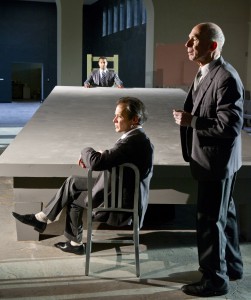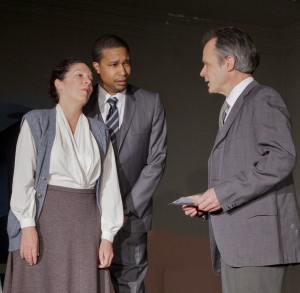Chiller Theater: Quantum Haunts the House with ‘All the Names’
On one level, Quantum Theatre’s new play All the Names is an experiment in spooky, surreal theatrical effects. Quantum has adapted a novel of the same title by staging it within the rooms of an old library building that has been turned into the high-art equivalent of a Halloween haunted house. The play also features two actors portraying the same character at the same time, a stunt rarely tried, let alone done well.

Double trouble: Senhor José (played simultaneously by James FitzGerald and Mark C. Thompson, foreground) must explain himself (or himselves) to the Registrar (Cameron Knight).
The two-actor trick works quite well. And more important, the unusual stage effects help All the Names to work on a deeper level. They help convey a fascinating story—the kind with emotional effects that sneak up on you, as there is more to it than may at first appear.
The novel is by the Portuguese writer José Saramago, who received the 1998 Nobel Prize in Literature. Since Portugal was once a dictatorship—ruled from 1932 to ‘74 by the right-wing Salazar regime—one might initially take All the Names to be a tale that fits neatly into a classic genre: dark, dystopian satire about a lonely individual trapped in a grim authoritarian bureaucracy.
Certainly the story has those overtones. The central character is Senhor José, a menial clerk in the “Central Registry” of an unnamed country. Within the vast and shadowy corridors of the Registry are kept the personal records of every citizen, living and dead. For Quantum’s production, a team of visual and dramatic artists have transformed the interior of the Carnegie Free Library of Allegheny (a historic North Side building now vacant) into a suitably eerie replica of the Registry. As the audience follows the actors from place to place, the strange narrative unfolds.
Lifestyles of the Drudges and the Famous
Senhor José—played by James FitzGerald and Mark Conway Thompson—is an aging bachelor who lives in a bungalow next to the Registry. (For this production, José’s home is in one of the library’s rooms, as are the sets for other scenes that take place outside the Registry.) His daily life consists of the same dreary rounds: punching in and dutifully filing name-cards and folders under the watchful and unforgiving eye of the chief Registrar (Cameron Knight).
But the compliant Senhor José has a private pleasure. After work he amuses himself by collecting photos and news clippings of the country’s celebrities: film and sports stars, politicians and bishops. Then one night he has a radical idea: to augment his collection by sneaking into the Registry to copy information on these people from the files—for, after all, there might be details that they don’t want to be known.
Here is where a lesser story would have a conventional plot twist. Surely, you may think, Senhor José will discover damaging secrets about his country’s powerful elite! But uh-uh, that’s not it. Instead, on one foray into the Registry he accidentally fishes up the index card for an ordinary middle-aged woman, with whom he becomes obsessed. He even ventures into the streets to find her—interviewing former neighbors and rifling through files kept elsewhere, all while daringly posing as a Registry deputy on official business.
What Senhor José learns cannot be told without spoilers. However, I will note that for a brief time our hero comes across as downright creepy. A stalker. Indeed, very much like an Internet stalker, he has dug up the identity of a woman he’s now pursuing.
But stalking is not what All the Names is ultimately about, either. It’s more of a look at who we really are. And that is where it gets complicated.
‘There’s More Than One of Me’

The godmother (Bridget Connors) has secrets she tries to keep hidden (and that’s Cameron Knight behind her, playing a secret).
Years ago, my circle of college friends included a woman who seemed deliberately strange. You know the type: somebody whose talk and dress seem calculated to be odd, as if announcing her singularity to the world. One day I had the nerve to ask her about this. She said her behavior was not calculated, nor did it have anything to do with being “singular.” On the contrary, she explained, “There’s more than one of me.”
Her comment is probably true of all of us. And it’s a theme that comes up repeatedly in All the Names.
For openers, we have the double actors playing Senhor José. FitzGerald is, as it were, the primary José, while Thompson is (shall we say) his other half—his subconscious voice, and also the imagined extension of himself. Words are inadequate to describe everything he does, for Thompson is a skilled physical performer who literally embodies the shadow–José.
Adding to the “more-than-one-of-me” theme, other actors play multiple roles. Bridget Connors plays all the women; Knight has parts beyond that of the Registrar—and while that is not unusual for a small-cast play, in All the Names it produces some remarkable effects.
Finally, although spoiler courtesy precludes giving away key events, I call your attention to a pivotal scene near the end of the first act, when Senhor José has located the godmother of the woman he is searching for. They have a rambling conversation lifted straight from the novel, part of which is as follows:
Godmother: Now I’m going to tell you something. I’ll begin by first asking how many people there are in a marriage.
José: Two.
Godmother: No, there are three people in a marriage. There’s what I like to call the third person—most important. The person composed of the other two together.
José: I’ve never thought of that.
Godmother: And can you really live with a person made up of two people?
José: I can barely live with myself.
Godmother: The most common thing in a marriage is for one or the other or both, each in their own way, to try to destroy the third person that they make together.
José: The arithmetic’s too complicated for me.
The excerpt offers a glimpse of what’s really up in All the Names. This play brings home the perplexing facts that not only do we have identities within identities, we have identities that transcend the identities we think we have.
One could delve further into the play’s meanings, observing, for instance, that nothing written in Registry files can capture the true identities of the people named … which leads, in turn, to the artistic quandary of authors and playwrights trying to “capture” life on a page or on the stage. But let’s not get lost in meta-messages. Maybe you should just see All the Names to find out what comes up for you. What comes up for every one of you, that is.
Closing Credits and Ticket Info
Saramago’s All the Names has been adapted and directed for the stage by Quantum Theatre’s artistic director, Karla Boos. The world-premiere production was devised with the collaboration of several artists: Chris Evans, Cindy Limauro, Barbara Luderowski, Sarah Pickett, Megan Monaghan Rivas, Joe Seamans, and Narelle Sissons. Among other things, they designed the settings and effects that are integral to the play.
All the Names runs through May 2 at the Original Carnegie Free Library of Allegheny, Allegheny Square East, North Side. For showtimes and tickets, visit Quantum or call 412-362-1713.
Photos by Heather Mull, courtesy of Quantum Theatre.
Mike Vargo, a Pittsburgh-based writer and editor, covers theater for Entertainment Central.
Share on Social Media
Follow Entertainment Central
Latest Stories
Sign up for the EC Newsletter








